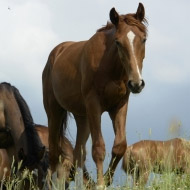Defra announces agreement to export UK horses to China

UK thoroughbred and jump horses can now be exported to China.
An agreement to export horses in the UK to China has been announced by Defra as part of plans to help grow the world leading equine industry.
Speaking on Friday, environment secretary Elizabeth Truss announced that UK thoroughbred and jump horses can now be exported to China after a crucial agreement was reached with the Chinese authorities helping grow the UK's £7 billion equine industry.
The new Export Health Certificate will allow for the export of horses to China with immediate effect. Initially worth up to £10 million a year for the UK economy, it is hoped that the value will rise significantly in coming years.
Environment secretary, Elizabeth Truss said: "I'm delighted that days after Great Britain finished top of the medal table at the World Equestrian Games, we're able to announce a deal that could bring up to £10 million of new trade to our shores.
"We've long been a world leader in racing, eventing and breeding - it's only right that our historic yet innovative equine industry is able to export its top-quality horses and expertise across the globe.
"This deal is only the latest in our determined push to boost British exports and I look forward to working with this £7 billion industry to ensure that it goes from strength to strength, growing our economy and providing enjoyment to millions."
Professor Tim Morris, the equine representative for the Animal Health and Welfare Board for England, said: "This country leads the world with its range of top quality horses and ponies. We have a unique combination of the best thoroughbred and sport horses, and a wide diversity of unique breeds from Shetland ponies to Shire horses, and the equine industry, particularly the breeding sector, welcomes this access to the developing Chinese market.
"Agreed with industry, this deal offers the best possible terms for the UK's equine industry and will enable industry to meet strong demand."
The first UK horses are expected to be exported to China by the end of this year.



 The Federation of Independent Veterinary Practices (FIVP) has announced a third season of its podcast, Practice Matters.
The Federation of Independent Veterinary Practices (FIVP) has announced a third season of its podcast, Practice Matters.